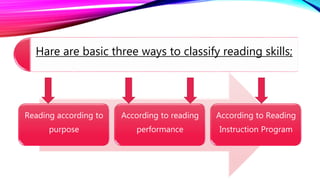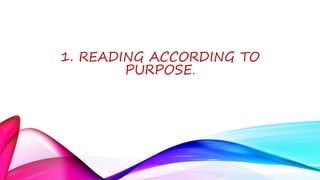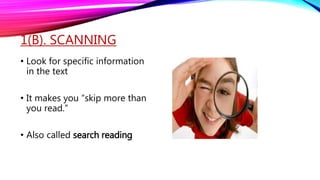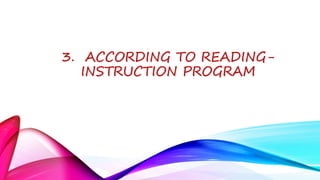Reading skills
- 1. ASSIGNMENT OF COMMUNICATION ON READING SKILLS Submitted by Umair Ahmad to Miss Sobia
- 3. Reading; • Reading is a process of retrieving the meaning of stored information or ideas. • The action or skill of reading written or printed matter silently or aloud: "suggestions for further reading"; "reading skills". • Written or printed matter that can be read: "his main reading was detective stories".
- 4. Reading skills; • Reading skills enable readers to turn writing into meaning and achieve the goals of reading independence, comprehension, and fluency. If reading skills appear to be lacking, then a reading skills assessment is recommended
- 5. • To acquire knowledge • Reading helps in mental development • Improvement of conversational skills • Helps readers to decipher new words • Developing vocabulary, language skills • If the reader don't know anything about a subject, then it will be difficult for him to grab the information.
- 6. THE WAY TO UNDERSTAND READING: Two ways: • 1. calling words – ability to recognize word structures • 2. understand words – ability to understand the meaning within the context of the words One does not exist without the other.
- 8. Hare are basic three ways to classify reading skills; Reading according to purpose According to reading performance According to Reading Instruction Program
- 9. 1. READING ACCORDING TO PURPOSE.
- 10. 1. READING ACCORDING TO PURPOSE.
- 11. 1(B). SCANNING • Look for specific information in the text • It makes you “skip more than you read.” • Also called search reading
- 12. Scanning - looking for a particular piece of information
- 13. 1.(A) SKIMMING; • General understanding of the whole text • Fastest type of reading based on purpose • Also called rapid-survey reading
- 14. Skimming - running the eyes over quickly, to get the gist
- 15. 1(C).DETAILED STUDY READING; • Requires serious reading and proper note taking • Uses the method of reading called SQ3R (Survey, Question, Reading, Recall, Review) • This reading works well in research projects and academic study.
- 16. 1(D). INTENSIVE READING; • Also called word-for-word type of reading • Requires one to read materials related to his/her field of specialization • The object of intensive reading demands a great deal of content-area reading.
- 17. 1(F). EXTENSIVE READING - • Also called light-type of reading • Reading for leisure • You love what you read. • longer texts for pleasure and needing global understanding
- 18. 1(G).LITERATURE READING • Not mainly for pleasure… but • Intends to familiarize readers with different genres of literature pieces: novels, short stories, biographies, dramas, epics, etc…
- 19. 2. ACCORDING TO READING PERFORMANCE /RATE OF UNDERSTANDING
- 20. 2. ACCORDING TO READING PERFORMANCE /RATE OF UNDERSTANDING
- 21. 2(A).SPEED READING; • Information tends to stay superficially in one’s mind. • Not a good method if your objective is to gain a deeper understanding of the text
- 22. SUBVOCALIZED READING; • One recognizes the form of the word and internally sounds it in the mind the way one pronounces it as a spoken word. • Focuses primarily on the form, stress, intonation, phrasing of the language • This prevents one from quick reading and comprehension of the text.
- 23. PROOFREADING • To see typographical errors • Proofreading vs. editing
- 24. SPE (STRUCTURE PROPOSITION EVALUATION); • Three stages 1.Recognizing language structures 2.Making inferences 3.Evaluation of ideas, reasons, or conclusions • Judgment is withheld until the text is fully understood.
- 25. MI (MULTIPLE INTELLIGENCES); • Enhances not only analytical intelligence but practical intelligence as well 1.Musical intelligence 2.Bodily-kinesthetic intelligence 3.Spatial intelligence 4.Interpersonal intelligence 5.Intrapersonal intelligence
- 26. 3. ACCORDING TO READING- INSTRUCTION PROGRAM
- 28. 1.READ ALOUD • Many teachers use this in instruction. • Students will learn good expressions, proper pacing, and correct pronunciation.
- 29. SHARED READING; • Both the teacher and student take turns in reading portions of the text. • It is also called as group reading. • Enhance IQ level. • It is necessary for students
- 30. GUIDED READING • Reader is left alone to do silent reading. • But the reader is motivated by the teacher by various strategies. using contextual clues, examining illustrations, activating schemata • Reader is not totally left alone.
- 31. FLUENCY READING; • Main objective: To gain mastery of the Pronunciation, Phrasing, Pausing, Intonation, Stress of the text. • Progress: measured by the number of words one can read aloud and comprehensions Qs answered correctly.
- 32. INDEPENDENT READING • One chooses the material s/he wants to read. • Still, the teacher helps you become an independent reader by surrounding your with interesting reading materials.
- 33. DEVELOPMENTAL READING • Aims to refine one’s reading comprehension skills by letting reader experience different reading stages: 1.Reading readiness in the nursery and kindergarten level 2.Beginning reading in Grades 1 and 2 3.Rapid growth in Grades 3 and 4 4.Refining and widening reading in the intermediate, HS, college level, and beyond the tertiary level
- 34. SELECTIVE OR KEY-WORD READING • Characterized by skimming and scanning • Mainly focuses on a specific or principal portion of the text to have a general view or holistic understanding of the reading material
- 35. REMEDIAL READING • One submits himself/herself to a reading program that will give him/her special reading sessions under the guidance of a reading specialist. • This requires one to reflect on thoughts. • If a reader lags behind with regard to his vocabulary knowledge, reading comprehension abilities, and reading attitudes, he must submit himself to a reading program that gives special reading sessions under the guidance of a reading specialist.
- 36. STRATEGIC READING • Regarded by some as the latest type of reading • Thinking aloud about what you reading or thinking of • You read with your eyes, but you also verbalize what you think about the text, thus, letting your mind focus on the correct responses to the questions about the passage. • Also called as meta-cognitive, meta-thinking, meta-reading, or meta- comprehension • Requires a reader to be alert, awake, and active • A reader uses or practices HOTS (higher-order thinking skills)




































